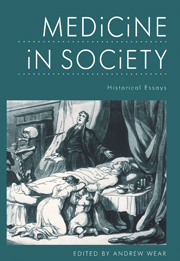Book contents
- Frontmatter
- Contents
- List of contributors
- Introduction
- Healers in the medical market place towards a social history of Graeco-Roman medicine
- Medicine and society in medieval Europe, 500-1500
- The patient in England, c. 1660–c. 1800
- Making sense of health and the environment in early modern England
- Medicine in the age of Enlightenment
- The rise of the modern hospital in Britain
- Medical practitioners 1750–1850 and the period of medical reform in Britain
- Public health, preventive medicine and professionalization: England and America in the nineteenth century
- Madness and its institutions
- From infectious to chronic diseases: changing patterns of sickness in the nineteenth and twentieth centuries
- Providers, ‘consumers’, the state and the delivery of health-care services in twentieth-century Britain
- The implications of increased life expectancy for family and social life
- Index
Healers in the medical market place towards a social history of Graeco-Roman medicine
Published online by Cambridge University Press: 13 January 2010
- Frontmatter
- Contents
- List of contributors
- Introduction
- Healers in the medical market place towards a social history of Graeco-Roman medicine
- Medicine and society in medieval Europe, 500-1500
- The patient in England, c. 1660–c. 1800
- Making sense of health and the environment in early modern England
- Medicine in the age of Enlightenment
- The rise of the modern hospital in Britain
- Medical practitioners 1750–1850 and the period of medical reform in Britain
- Public health, preventive medicine and professionalization: England and America in the nineteenth century
- Madness and its institutions
- From infectious to chronic diseases: changing patterns of sickness in the nineteenth and twentieth centuries
- Providers, ‘consumers’, the state and the delivery of health-care services in twentieth-century Britain
- The implications of increased life expectancy for family and social life
- Index
Summary
Homeric Greece
The earliest literary record of classical Greece, the Iliad of Homer, provided the ancient doctor with both a paradigm of his success and a premonition of his failure. Among the Greek heroes who fought in the Trojan war were Podalirius and Machaon, the physician sons of Asclepius and Epione, who not only gave medical assistance but also took their places in the battle line. When Machaon was wounded by Paris' arrow in his right shoulder, Idomeneus ordered Nestor to remove him to safety in his chariot, for
a doctor is worth many men put together,
at extracting arrows and applying soothing ointments.
This quotation became a favourite among the Greeks, and its praise of the physician was further strengthened by the frequent omission of the qualification in the second line. It confirmed the doctor's own self-image as a man somehow raised above the majority by his skills, and could be supplemented by another passage from Homer's Odyssey which placed him among those whose fame could spread throughout the world.
At the same time, although these healers might be on hand to treat wounds, they were by no means always successful. The great plague that afflicted the Greek army before Troy was not stayed by human power but by the divine intervention of Apollo, whose anger at the insult done to his priest had caused him to shoot his deadly arrows at the Greeks, ‘ so that the funeral pyres burnt incessantly ’.
- Type
- Chapter
- Information
- Medicine in SocietyHistorical Essays, pp. 15 - 58Publisher: Cambridge University PressPrint publication year: 1992
- 27
- Cited by



